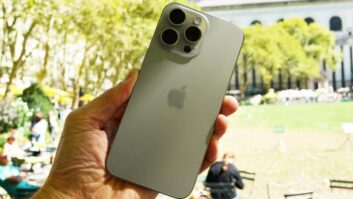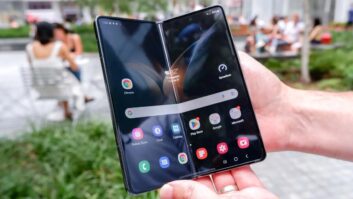I know why American productivity is down. We’re all chasing down rumors, which used to be called news stories, appearing on the Web.
Such was the case when I followed up a “news” report that said “select RadioShack locationsacross the country” would begin March 5 to offer Verizon Wireless handsets. At the end, the story added, “UPDATE: Added another inventory shot to the jump and clarified that VZW gear will be carried by select stores, not all stores — at least initially.”
Sounds like the initial report mentioned all RadioShack stores would carry Verizon again. That’s a major backtrack.
Whether select stores or all stores, however, this would be big news because, in 2005, RadioShack announced that it would end its five-year relationship with Verizon Wireless. At that time, RadioShack announced a 10-year agreement with Cingular Wireless, now AT&T, to replace Verizon, effective January 2006. RadioShack also extended its decade-long relationship with Sprint PCS with a new 10-year contract.
The RadioShack-Verizon divorce followed Verizon’s launch of Verizon-operated stores within Circuit City in the second half of 2004.
At the time of the Verizon-RadioShack split, Verizon COO Lowell McAdam noted, “Verizon Wireless and RadioShack are moving in opposite directions as it relates to wireless communications sales. It no longer made sense to continue the relationship given the high cost of this channel relative to other distribution channels and our insistence that growth and profit be balanced.”
For its part, RadioShack cited several reasons for the breakup, including the fact that it was “imperative to introduce a GSM carrier to remain competitive.”
“After assessing the marketplace, the technology roadmaps of each carrier, and each carrier’s value proposition as it relates to our customer base, we decided it was imperative to introduce a GSM carrier to remain competitive,” RadioShack’s then-president/CEO Dave Edmondson. “Cingular was our GSM choice as they are the largest wireless carrier in the U.S.”
So are RadioShack and Verizon Wireless ready to patch things up and take the first steps toward a new national agreement? It might make sense, though when is another question. Verizon could use some “points of presence” to fill the gap left by Circuit City’s demise. RadioShack might be interested in replacing a weakened Sprint with stronger Verizon, now the nation’s largest carrier by subscriber base following multiple acquisitions.
To add Verizon, however, RadioShack might have to renegotiate or drop out of its 10-year national contracts with either Sprint or AT&T, and we’d have to ignore RadioShack chairman/CEO Julian Day’s recent comments in TWICE that the chain has enjoyed a strong resurgence in its post-paid Sprint and AT&T wireless businesses.
So I made some calls and found a little truth to the report, but it’s not as significant as you might think.
“Select” RadioShack stores means about 27 corporate-owned stores, which had been selling Unicel-branded service in rural areas in about nine states. Verizon purchased Unicel parent Rural Wireless Corp. to extend its footprint and reduce roaming fees. When the purchase was completed, Verizon had to renegotiate agreements with Unicel agents, some of which were RadioShack stores. Those stores just began to sell Verizon service.
That’s 27 stores in secondary and tertiary markets out of 4,400 corporate stores and 1,400 franchised stores, and getting into RadioShack stores was certainly not the reason that Verizon acquired Unicel. The 27 stores are in Maine, New Hampshire, New York, Oregon, Washington, Vermont, Minnesota and South Dakota.
RadioShack’s franchised stores, by the way, have always had the flexibility to offer services from carriers other than Sprint and AT&T, depending on the franchisees’ contract with RadioShack.
Another acquisition could also put Verizon is some additional RadioShack stores. Verizon closed its purchase of Alltel in January to gain a larger footprint and economies of scale. “There were some RadioShack stores selling Alltel service,” a spokesperson noted, but “no decision has been made regarding the future of Verizon Wireless in those stores.”
In 105 Alltel markets in 22 states, however, Verizon won’t have to make any decisions at all. In those markets, Verizon and Alltel competed, and under mandate by federal regulators, Verizon must divest itself of those markets. The operations in those areas continue to be operated and marketed independently of Verizon management under the Alltel name.
So, pretty soon, you might be reading some blogs about RadioShack offering Verizon in more stores, but it won’t mean they’re ready for a national long-term commitment.













